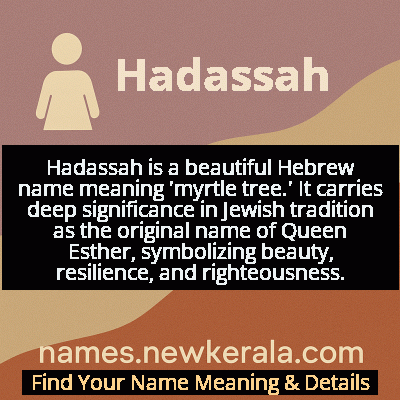Hadassah Name Meaning & Details
Origin, Popularity, Numerology Analysis & Name Meaning of Hadassah
Discover the origin, meaning, and cultural significance of the name HADASSAH. Delve into its historical roots and explore the lasting impact it has had on communities and traditions.
Name
Hadassah
Gender
Female
Origin
Hebrew
Lucky Number
7
Meaning of the Name - Hadassah
Hadassah is a beautiful Hebrew name meaning 'myrtle tree.' It carries deep significance in Jewish tradition as the original name of Queen Esther, symbolizing beauty, resilience, and righteousness.
Hadassah - Complete Numerology Analysis
Your Numerology Number
Based on Pythagorean Numerology System
Ruling Planet
Neptune (Ketu)
Positive Nature
Intuitive, analytical, spiritual, and inquisitive.
Negative Traits
Secretive, reserved, aloof, and can be overly critical.
Lucky Colours
Green, yellow.
Lucky Days
Monday.
Lucky Stones
Cat’s eye, moonstone.
Harmony Numbers
1, 5, 6.
Best Suited Professions
Scientists, researchers, spiritual leaders, detectives.
What People Like About You
Depth of knowledge, analytical skills, spirituality.
Famous People Named Hadassah
Hadassah of the Bible
Biblical Queen
Original Hebrew name of Queen Esther, who saved the Jewish people from genocide in ancient Persia
Henrietta Szold
Zionist leader and founder
Founded Hadassah Women's Zionist Organization of America, established major medical centers in Israel
Hadassah Lieberman
Political spouse and activist
Wife of Senator Joe Lieberman, advocate for healthcare and women's issues
Hadassah B. Perlman
Medical researcher
Pioneering work in pediatric medicine and public health
Name Variations & International Equivalents
Click on blue names to explore their detailed meanings. Gray names with will be available soon.
Cultural & Historical Significance
The name gained additional prominence in the 20th century through the establishment of Hadassah, the Women's Zionist Organization of America, which has become one of the largest Jewish organizations worldwide, operating major medical centers and educational programs in Israel. This modern institutionalization of the name has reinforced its association with Jewish identity, women's leadership, and humanitarian work. The dual legacy of biblical heroism and contemporary social activism makes Hadassah a name that bridges ancient tradition with modern Jewish life.
Extended Personality Analysis
Women named Hadassah are often perceived as possessing a blend of strength and grace, reflecting the qualities of their biblical namesake. They tend to be compassionate yet determined individuals who combine traditional values with modern sensibilities. The name suggests someone with deep spiritual or moral convictions, often displaying quiet confidence and the ability to lead when circumstances demand. Hadassahs are frequently described as intuitive and perceptive, with a natural elegance and diplomatic approach to challenges.
These individuals typically value family and community, showing loyalty to those they care about while maintaining the courage to stand up for their beliefs. The name carries an expectation of integrity and purpose-driven action, often resulting in Hadassahs being seen as pillars of their communities. This combination of gentle strength and principled action makes them respected figures in their social circles, capable of influencing others through both compassion and conviction. The myrtle symbolism further suggests someone who can thrive in various environments while maintaining their core identity.
Modern Usage & Popularity
Hadassah has experienced a resurgence in popularity in recent decades, particularly among Jewish families seeking to honor their heritage while choosing distinctive names. While not among the most common names, it maintains steady usage in Jewish communities worldwide and has gained some crossover appeal among non-Jewish parents attracted to its melodic sound and rich history. The name ranks outside the top 1000 in the United States but shows consistent usage in Israel and Jewish diaspora communities. Modern parents often choose Hadassah for its combination of traditional roots and unique quality, appealing to those who want a name with spiritual depth that stands out from more common biblical names. The name's association with strong female leadership and its beautiful sound continue to attract contemporary parents looking for meaningful names with historical significance.
Symbolic & Spiritual Meanings
The name Hadassah carries rich symbolic meaning derived from its literal translation as 'myrtle tree.' In Jewish tradition, the myrtle represents peace, love, and righteousness, often associated with the Garden of Eden and messianic times. The myrtle's evergreen nature symbolizes eternal life and resilience, while its fragrant blossoms represent sweetness and spiritual purity. In the context of Queen Esther's story, Hadassah symbolizes hidden identity and revealed purpose - just as Esther concealed her Jewish identity until the crucial moment, the name suggests depth and layers waiting to be uncovered. The myrtle tree's ability to thrive in various conditions also symbolizes adaptability and strength through challenges, making Hadassah a name that embodies both delicate beauty and enduring spirit, representing the ideal of maintaining one's essence while navigating different circumstances.

